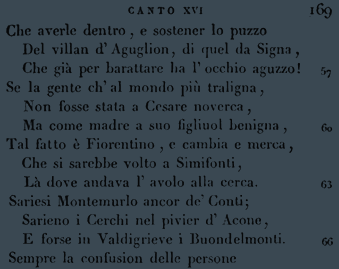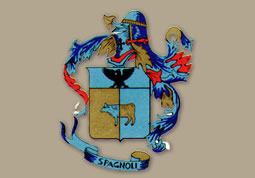| |
|
Dante Alighieri was born in May 1265 in Florence. His father, Alighiero, was the scion of a noble (but not particularly wealthy) Guelph family. Dante studied in Florence and Bologna, learning the art of rhetoric, and taught himself the art of "saying words in rhyme" (poetry), to which he passionately and ingeniously dedicated himself from his early years onwards.
Dante was a friend of many famous poets, and especially of Guido Cavalcanti, Lapo Gianni and Cino da Pistoia, with whom – as was the fashion in those days – he corresponded in verse. He fell in love with Beatrice, the daughter of Folco Portinari, when he was 18. Although Beatrice went on to marry Simone dei Bardi, Dante wrote numerous poems for her in the "sweet new style" (dolce stil novo). After her death in 1290, Dante spent more and more time on his studies of classical works and modern Italian, French and Provençal literature, as well as theology, politics, philosophy, rhetoric, art and language.
|

|
In order to participate in the political life of Florence, Dante became a member of the Guild of Physicians and Apothecaries. At that time, having banished the Ghibellines from the city, the Guelphs of Florence split into two factions: the White Guelphs, led by the Cerchi family, and the Black Guelphs, led by the Donati family. Dante aligned himself with the former, who more jealously guarded the independence of the city, even though he himself had married a member of the Donati family, Gemma, who bore him three children – Iacopo, Pietro and Antonia – before going on to become a nun and taking the name Beatrice. Between 1295 and 1296, Dante was a member of the Special Council of the Captain of the People and of the Council of the Hundred. From 15 June to 15 August 1300, he served as one of the Priors of Florence. In 1301, the Black Guelphs, with the support of Charles of Valois (sent by Pope Boniface VIII), came to power and banished the White Guelphs. Dante, who had visited the Pope to convince him to desist from his intention to interfere in the political life of the comune of Florence, was forbidden from returning to the city, since he had been condemned to two years in exile under the false accusation of corruption. From then on, he lived in exile, continuing to reject the invitation of the Florentines to return to the city on condition that he plead guilty to the crimes of which he had been unjustly accused.
The Cerchi family moved to Florence, but retained their residence at Acone – this explains why Dante was able to frequent them at Castel d'Acone. The House of Cerchi and the country parish of Acone were mentioned by Dante in the Divine Comedy (Paradiso, Canto XVI, 65).
Florence: site of love and sadness for Dante, recurring image in the Divine Comedy, locus of dramatic passions in the Inferno, historical symbol and source of indignant oratorial fervour against the ills that afflicted Italy in the Purgatorio, elegiac marker of the good old days in the Paradiso, where the capacity for forgiveness and the just moral values are emphasised.
|
|
|



